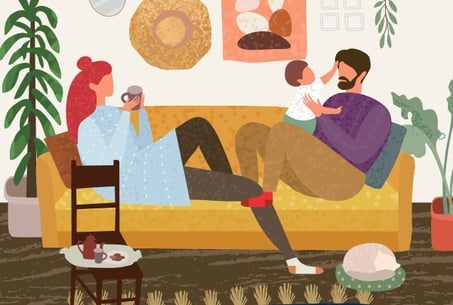Primary Caregiver Fathers and Mothers are Equally Competent
2 min read
Date Published: 03/01/2022
Last Updated: 03/17/2022
National Fatherhood Initiative Blog / Latest Articles
2 min read

This article is written by Duncan Fisher and was originally published at the Child and Family Blog, UK. It is republished here with permission.
The high quality of parenting demonstrated by primary caregiver fathers suggests that more fathers should be encouraged to be very involved in caregiving.
A new study from Cambridge University in the United Kingdom compared primary caregiver fathers, primary caregiver mothers, and dual earner mother/father couples. The researchers found no statistically significant differences in parenting quality, depression, anxiety, stress, feeling of social support, marital quality, conflict with the child, or the child’s own behavior (i.e., adjustment).
The researchers conclude: “The present study challenges the assumption that women are more suited to primary caregiving than men … fathers and mothers are equally competent at parenting in the primary caregiving role.”
Based on this finding, they recommend: “The high quality of parenting demonstrated by the primary caregiver fathers suggests that more fathers should be encouraged to be highly involved parents. To do so, policies facilitating this, such as shared parental leave and flexible work, including more part-time employment options, need to be widely promoted both by governments and by individual organizations.”
Previous research on primary caregiver fathers has often focused on gay fathers who became parents through adoption and surrogacy. These studies also found that children’s adjustment was positive. This study extends the research to heterosexual parent couples.
The study took place in the United Kingdom between 2017 and 2019, and involved 41 primary caregiver fathers, 45 primary caregiver mothers, and 41 dual earner couples (both mother and father). The primary caregiver mothers and fathers had been the primary caregivers for at least 6 months, with children from 3 to 6 years old. Their partner was the primary wage earner; some primary caregivers (fathers more than mothers) were also employed part time or worked flexibly from home, but they spent more time caregiving than working. In the dual earner families, both parents were in paid employment and many worked full time. The families were mostly White and highly educated, and had no serious financial difficulties.
Through questionnaires and interviews, the researchers used previously tested measures to assess depression, anxiety, stress, social support, marital quality, the coparenting relationship, parental acceptance/rejection of the child, parenting quality, and children’s behavior. When assessing children’s behavior, the children’s preschool or schoolteacher also completed a questionnaire.
This research confirms a large body of earlier research showing that the parenting behaviors of fathers and mothers are similar, as is their influence on children’s development. Primary caregiver fathers typically describe their role in nurturing terms as fostering a close bond with their child.
In one study, compared to primary earner fathers, primary caregiver fathers showed higher emotional tone and their 12-month-olds showed more positive mood. In another study, very involved fathers had a more playful interaction style than the mothers, though both these mothers and fathers smiled more and imitated their child more than less-involved fathers. In other studies, primary caregiver mothers were more affectionate with their 3-month-olds and their 8- to 12-month-olds than primary caregiver fathers.
Other studies have found that primary caregiver fathers face particular social pressures – social isolation in a mother-dominated world of playgroups and playgrounds, the stigma of adopting a non-traditional role, and less social support. However, in this study, the fathers reported positive well-being. Perhaps the strong marital relationships and coparenting arrangements were enough to compensate for any additional social pressure.
References
Jones C, Foley S & Golombok S (2021), Parenting and child adjustment in families with primary caregiver fathers, Journal of Family Psychology
Date Published: 03/01/2022
Last Updated: 03/17/2022
Download the ebook to learn how to create fatherhood initiatives that engage every sector of community life.

Train Your Staff
Fatherhood Programs
Fatherhood Data
© 2025 National Fatherhood Initiative®. All rights reserved.